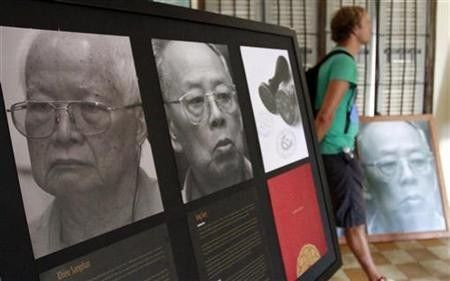Khmer Rouge Trial Opens in Cambodia; 'Killing Fields' Victims to Testify

Three former Khmer Rouge bosses went on trial in Phnom Penh, Cambodia on Monday, more than 30 years after millions of people were murdered in the killing fields of Communist Cambodia.
Former Khmer Rouge second-in-command Nuon Chea, former President Khieu Samphan and former Foreign Minister Ieng Sary, all of whom are now in their 80s, sat in court surrounded by hundreds of spectators and judges to hear the opening statements. The three have been accused of crimes against humanity, war crimes and genocide, along with charges of murder, extermination, enslavement, imprisonment, torture, persecution and willful killing dating back to the 1970s.
They used to be big shots in the Khmer Rouge time, and they were like a God who ordered you can die, you can survive by their order, and now it’s their turn to be in the court,” Cambodian-American journalist Neou Sarem said of the three men during the hearing.
All three defendants on Monday again maintained their innocence.
A fourth defendant, Ieng Thirith, the wife of Ieng Sary and the former minister for social affairs of Cambodia, was ruled unfit to stand trial. Ieng suffers from Alzheimer's disease and is waiting an appeals trial.
The Khmer Rouge criminal tribunal was established by a treaty between the United Nations and Cambodia. Between 1975 and 1979, the Khmer Rouge regime under Pol Pot killed about a quarter of Cambodia's total population, somewhere between 1.5 and 2 million people. The regime forced people out of cities and into labor camps, now referred to as Killing Fields, where many died of starvation.
Additionally, the government targeted and murdered intellectuals and anyone deemed disloyal.
The scope of the horror in Cambodia has made the trial difficult for many Cambodian citizens, as well as the court.
“The first thing is that we are dealing with nearly two million dead, so there isn’t anybody in this country that has been unaffected by what happened during the Khmer Rouge period, co-prosecutor Andre Cayley said last week.
So I think there are a great many Cambodians that are interested in the outcome.
On Sunday, people gathered at former death camps to commemorate those who died under the Khmer Rouge. Additionally, some of the 4,000 remaining victims recognized by the U.N. will be involved in the case.
“I am glad I will be called as a witness. It is us who can tell these judges the greatness of our suffering,” former Siem Reap prisoner Sum Rithy told the Phnom Penh Post.
“I will tell the judges how my hands were always tied behind my back at night, I will tell them how I was ordered to eat human feces, how the people in the prison died with their eyes open, how I wished to be dead so I would no longer see such horror.”
© Copyright IBTimes 2024. All rights reserved.





















